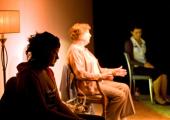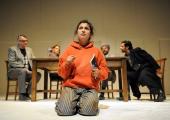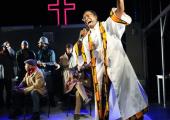Little Gem, Bush Theatre



In December 2004, Gurpreet Kaur Bhatti’s play Behzti (Dishonour) caused riots when it was staged at Birmingham Rep. It concerned the (fictional) story of a child rape in a gurdwara (a Sikh temple) and the theatre, in a well-intentioned but misguided act, invited local Sikh leaders to a preview. They asked for changes to be made (relocating the play to a community centre), Bhatti refused, the play went ahead as she wrote it, riots ensued and violent threats were made. She went into hiding and the play was cancelled after just a few performances.

Sarah Kane’s last play is the stuff of legend. Since its first production some 18 months after her suicide in 1999, it’s become a favourite with black-attired drama students, nostalgic in-yer-face drama buffs and mainstream theatres all over mainland Europe. But it is rarely performed in big spaces in this country – apparently because artistic directors feel it would empty their venues. So this version, directed by Grzegorz Jarzyna of Poland’s TR Warszawa on the Barbican's main stage, is a good chance to see what we’ve been missing. Or is it?

Imagine a future, a near future, in which gangs of teenage boys roam the deserted streets of the metropolis, selling hallucinatory butterflies and organising parties in squats for rich clients who have extreme tastes in sexual abuse. Imagine. This is the vividly conceived sci-fi world of Philip Ridley’s Mercury Fur, first staged in 2005 and now revived in an old London office block by the thrilling fringe company Theatre Delicatessen.

Okay, now that you’re a citizen of Dystopia, and you’ve reached the regulation old age, it’s time to check into an approved care home. Please enter the Ark, and take your allotted bed. A government official will be with you in due course. Yes, that’s right, just take those pills and you will be fine. Will you be expecting visitors? Okay. Any problems, just ask Nurse. In Tamsin Oglesby’s satirical new drama, which opened last night at the National's Cottesloe space, the biblically named Ark is not a means of salvation but an instrument of euthanasia.

Synaesthesia is a tricky beast. It’s basically a neurological condition which condemns those afflicted with it to a life in which words evoke colours, and emotions can be experienced as colour. Sometimes it is almost playful, with the mere names of the days of the week evoking tonal sensations; at other times it is intensely painful, with the mere glimpse of a buzzy pattern causing dizziness or strong feelings conjuring up great blasts of colour, an unbearable onslaught of confusion and derangement.

The Russians have always been good at writers' houses. The Soviets especially. When I first saw Tolstoy's house his blue smock was hanging behind the door, a manuscript was on his desk but the chair pushed back as if he'd nipped out for a moment and would be back. It was a frankly theatrical effect and the better for it. Like Tolstoy’s, Chekhov's two houses - one in Melikhovo near Moscow and the other in Yalta in the south - were well funded and maintained and imaginatively presented in those days. Only the last is true now.

In a life so short it is always a shock to remember the fact. Chekhov lost more friends than most people do by 60, but he has gained hundreds of thousands who love that fugitive figure, its guardedly attentive attitude, the merciless word in the right place, the moral force lightly carried: one thinks of him in the most unexpected corners of life.

She’s the most famous young pout in Hollywood. And her first West End appearance has already sparked a media frenzy, making this contemporary version of Molière’s The Misanthrope the hottest ticket in town, with massive advance bookings already guaranteeing anyone associated with the show a credit-crunch-proof Christmas. Of course, I’m talking about Keira Knightley – I mean, who isn’t? But what about the play, which opened last night with a barrage of paparazzi flashbulbs?
